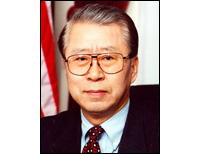McCarthyism
The Communist Party of the Soviet Union seized power through the 1917 revolution in Russia with the slogan of creating a perfectly equal society without classes. It meant the abolition of private ownership of property and, unlike socialism, not only the state’s ownership of the means of production but also equal distribution of production.
Americans became scared of communism as it was sweeping over not only Eastern Europe but also China in the 1940s. That was the time when Joseph McCarthy, a senator from Wisconsin, shocked American society with his claim that “communists are operating in the U.S., and I have a list of 297 of them.” The U.S. defined any communist activity as an act of treason against the foundation of America ― a democracy built with the blood and sweat of the people under a free market system ― because communism would deny personal freedom and private property. Accordingly, the U.S. House formed the House Un-American Activities Committee to investigate anti-American communist activities in 1947. Its aim was to prevent communism from subverting the U.S.
The wild anti-communist hysteria that swept the U.S. during that time is called “McCarthyism.” In this hysteria, innocent people lost their jobs and even went to prison. A report that the Communist Party USA had nearly 75,000 members in 1940 terrified Americans. Following a demand from Congress, President Truman expanded the FBI from 3,356 agents to 7,029 by1952. However, Americans soon tired of McCarthyism, a movement that seemed to lack discretion, and the Supreme Court also clarified repeatedly through its decisions that freedom of thought and freedom of expression precede national security.
McCarthyism gave Americans an opportunity for self-reflection and provided a motivation for them to arrive at an expanded appreciation for the value of freedom of thought. The Communist Party is still registered and operating openly in the U.S. Not long ago, it even expressed its endorsement for President Obama, but nobody pays attention to the party.
There is also an opinion that McCarthyism made a positive contribution. It stirred up patriotism nationwide after the doldrums of the Depression, and united people to prevent communism from spreading in the U.S. And it motivated the country to protect free democracy from those who wanted to shake the foundation of the U.S. In the end, communism disappeared from the earth due to its own contradictions, and North Korea, the only remaining Stalinist nation, became the poorest country in the world due to its hereditary autocracy.
The contradiction of communism is this: Equality in labor and distribution requires surveillance, which produces layers of surveillance and oversight. This leads to the concentration of power to a few at the top. The poor live in a society far from an equal society, but of a terrifying surveillance where, without food rations, they can starve to death.
Ironically, however, pro-North Korea groups that follow this failed system have grown in the Republic of Korea of the 21st century, and now they have infiltrated the National Assembly and made a statement overtly denying the significance of our national anthem. A member of the National Assembly takes an oath to “obey the Constitution of the Republic of Korea and put the interest of the Republic of Korea first.” However these pro-North Korea lawmakers enjoy a good living and freedom in the South while always siding with the North. Members of the National Assembly of the Republic of Korea should be loyal only to the Republic of Korea. They cannot serve two countries. If they do not like it, they should resign from the Assembly. However, they criticize those who call them “followers of North Korea” as employing “new McCarthyism.”
If, in the U.S., a lawmaker like them makes a statement denying the significance of “The Star-Spangled Banner” as the national anthem, all hell will break loose. The person will lose his seat, and a storm of criticism will make it difficult for him to be taken seriously anymore.
I wish that the Republic of Korea were also a peaceful country where only those who love the country live. Watching a member of the National Assembly insulting our national anthem and denying our country made me shiver. It was because of the vivid images I have of many overseas Koreans who still cry every time they sing our national anthem thinking of our country while in foreign lands. <The Korea Times/Jay Kim>





















































